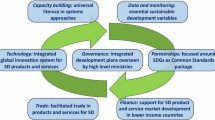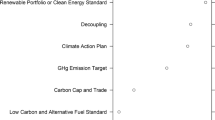Abstract
The EU Structural and Cohesion Funds (SCF) are potentially important instruments for supporting climate policy-related efforts and addressing unevenly distributed capacities for successful mitigation and adaptation across the EU. This paper reports on the level of climate mainstreaming in EU regional development policy in the 2007–2013 programming period: first, we explore the normative commitment to climate change concerns through an analysis of the National Strategic Reference Frameworks (NSRFs) in which all 27 Member States specify their development and funding priorities. Second, we analyze the substantive commitments by mapping financial allocations from the SCF related to climate mitigation and adaptation. Based on this, we gain five main insights, which are relevant to future mainstreaming efforts and which may have important implications for the wider debate on the purpose of European regional policy: (1) mitigation appears well mainstreamed in EU cohesion policies, both in normative and financial terms, whereas adaptation is hardly considered. (2) Rhetorical commitment to climate concerns in the strategy documents does not necessarily match financial allocations to respective priorities. (3) Neither mitigation nor adaptation-relevant priorities and allocations in the NSRFs can be linked to the ambitious mitigation targets and low adaptive capacity, respectively. (4) There is ample potential to improve climate-relevant SCF support in the area of adaptation, particularly given that several existing priority areas for funding coincide with the climate adaptation agenda. (5) By conditioning a minimum percentage of funds to be spent on priority areas (earmarking), cohesion policy also gains meaning as a burden sharing instrument for adaptation to climate change.





Similar content being viewed by others
References
ADE s.a. (2009) Ex-post evaluation of cohesion policy programmes 2000–2006 co-financed by the European Fund for Regional Development (Objectives 1 and 2)—Work Package 5b: Environment and Climate Change
Adelle C, Pallemaerts M, and Baldock D (2008) Turning the EU budget into an instrument to support the fight against climate change, Sieps Swedish Institute for European Policy Studies
Baltzar E, Venelina V, Zhechkov R (2009) Improving the climate resilience of Cohesion Policy funding programmes. An overview of Member States’ measures and tools for climate proofing cohesion policy funds. ENEA Working Group on climate change and cohesion policy
Barnett J, Lambert S, Fry I (2008) The hazards of indicators: insights from the environmental vulnerability index. Ann Assoc Am Geogr 98(1):102
Behrens A, Ferrer JN and Egenhofer C (2008) Financial impacts of climate change: implications for the EU budget, CEPS
Bouwer LM, Aerts JCJH (2006) Financing climate change adaptation. Disasters 30(1):49–63
Douma A (2009) Are capital flows from Europe climate proof?. Both Ends, Amsterdam
EEA (European Environmental Agency) (2005) Environmental policy integration in Europe. State of play and an evaluation framework
Engle NL (2011) Adaptive capacity and its assessment. Glob Environ Chang 21(2):647–656
European Commission (2009) White Paper. Adapting to climate change: towards a European framework for action
European Commission (2010) Europe 2020 a strategy for smart, sustainable and inclusive growth. Com (2010–2020)
European Council (2006) Regulation (EC) No 1083/2006 laying down general provisions on the European Regional Development Fund, the European Social Fund and the Cohesion Fund and repealing Regulation (EC) No 1260/1999
European Parliament (2011) Report on absorption of structural and cohesion Funds: lessons learnt for the future cohesion policy of the EU (2010/2305(INI))
Green Alliance (2010) Unlocking a low-carbon Europe. Perspectives on EU budget reform
Huq S, Reid H (2004) Mainstreaming adaptation in development. IDS Bull 35(3):15–21
IPCC (2007) Climate change 2007: impacts, adaptation and vulnerability. In: Parry M et al (eds) Cambridge University Press, Cambridge
IPCC (2012) Managing the risks of extreme events and disasters to advance climate change adaptation. In: Field C et al (eds) Cambridge University Press, Cambridge
Jordan A, Lenschow A (2008) Innovation in environmental policy? Integrating the environment for sustainability. Edward Elgar Publishing Ltd
Jordan A, Lenschow A (2010) Environmental policy integration: a state of the art review. Environ Policy Gov 20(3):147–158
Jordan A, Schout A (2006) The coordination of the European Union: exploring the capacities of networked governance. Oxford University Press, Oxford
Klein RJT, Schipper ELF, Dessai S (2005) Integrating mitigation and adaptation into climate and development policy: three research questions. Environ Sci Policy 8(6):579–588
Lafferty W, Hovden E (2002) Environmental policy integration: towards an analytical framework?. University of Oslo, Oslo
Lafferty W, Hovden E (2003) Environmental policy integration: towards an analytical framework. Environ Politics 12(3):1
Lenschow A (1999) The greening of the EU: the common agricultural policy and the structural funds. Environ Plann C Gov Policy 17(1):91–108
Lung T, Lavalle C, Hiederer R, Dosio A, Bouwer LM (2013) A multi-hazard regional level impact assessment for Europe combining indicators of climatic and non-climatic change. Glob Environ Chang 23(2):522–536
Mickwitz P, Aix F, Beck S, Carss D, Ferrand, N., Goerg, C, van Bommel S (2009) Climate policy integration, Coherence and Governance PEER Report II
OECD (2011) Handbook on the OECD DAC climate markers. Paris
Persson A (2009) Environmental policy integration and bilateral development assistance: challenges and opportunities with an evolving governance framework. Int Environ Agreem 9(4):409–429
Persson A, Klein R (2009) Mainstreaming adaptation to climate change into official development aid: building on EPI theory. In: Harris, P (ed) Environmental change and foreign policy: theory and practice. Routledge
Smit B, Wandel J (2006) Adaptation, adaptive capacity and vulnerability. Glob Environ Chang 16(3):282–292
UNFCCC (2007) Investment and financial flows to address climate change. United Nations Framework Convention on Climate Change, Climate Change Secretariat, Bonn
Yohe G, Tol RSJ (2002) Indicators for social and economic coping capacity—moving toward a working definition of adaptive capacity. Glob Environ Chang 12(1):25–40
Acknowledgments
The research for this study has been funded by DG Research through the FP7 project European RESPONSES to Climate Change. We would like to thank Eleni Dellas and Laura Meller for their help with the document analysis in Cyprus and Finland, as well as Anthony Patt and Tim Rayner for comments on an earlier draft of this paper. Finally, we are very grateful to the experts from DG Regio, who provided input on the weighting of priority themes and two anonymous reviewers for their constructive feedback. Any remaining errors of fact or interpretation are our own.
Author information
Authors and Affiliations
Corresponding author
Electronic supplementary material
Below is the link to the electronic supplementary material.
Rights and permissions
About this article
Cite this article
Hanger, S., Haug, C., Lung, T. et al. Mainstreaming climate change in regional development policy in Europe: five insights from the 2007–2013 programming period. Reg Environ Change 15, 973–985 (2015). https://doi.org/10.1007/s10113-013-0549-9
Received:
Accepted:
Published:
Issue Date:
DOI: https://doi.org/10.1007/s10113-013-0549-9




